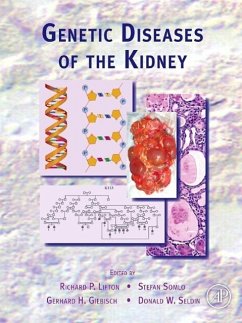Genetic approaches have revolutionized our understanding of the fundamental causes of human disease by permitting the identification of specific genes in which variation causes or contributes to susceptibility to, or protection from, disease. More than 2,000 disease genes have been identified in the last 20 years, providing important new insight into the pathophysiology of diseases in every field of medicine. Genetic Diseases of the Kidney offers expert insight into the role of genetic abnormalities in the pathogenesis of abnormal kidney function and kidney disease. Genetic abnormalities are carefully presented within the appropriate physiologic context so that readers will understand not only which genes are linked to which diseases but also which pathways lead from a genetic "disturbance to the systemic appearance of disease.
Hinweis: Dieser Artikel kann nur an eine deutsche Lieferadresse ausgeliefert werden.
Hinweis: Dieser Artikel kann nur an eine deutsche Lieferadresse ausgeliefert werden.
"A fine book like this for nephrology is long overdue. The kidney, historically rich in its contribution to modern genetics, needs an authoritative landmark for new learning, understanding, and reference. Genetic Diseases of the Kidney is comprehensive, containing 47 well-written chapters that are edited beautifully. Clinicians, trainees, and scientists will easily marvel at seeming complexity made truly understandable. Written with clarity and acumen by leading authorities, it strikes the right balance between overview and detail. References to each chapter have been carefully selected to reflect a wealthy resource for further reading." --Eric G. Neilson, MD, Hugh Jackson Morgan Professor of Medicine, Vanderbilt University School of Medicine, Nashville, TN, USA
".The field of kidney diseases has been lucky to have Richard Lifton, one of the major figures in this revolution, devote his energies to syndromes causing kidney failure and hypertension. His discoveries have energized the field, bringing into it many exciting young investigators. The new textbook Genetics Diseases of the Kidney, edited by Lifton, Somlo Giebisch and Seldin, combines the expertise of genetics and physiology in an admirable manner. The chapters cover many practical and theoretical areas: from basic principles of genetic inheritance to detailed analysis of the many newly described syndromes of genetic renal disease. For the general nephrologist or internist there is also a helpful chapter on what is available today in genetic diagnosis - this should aid the clinician in testing and making the appropriate diagnosis. The explosion of recent genetic information had made the general textbooks of genetic medicine quite unwieldy but the publication of this textbook is a welcome addition and fills a real need. The identification of the function of such medically important genes makes this book essential not only for nephrologists but for all scientists interested in the structure and function of the kidney." --Qais Al-Awqati, MB, ChB, Professor of Medicine & Physiology, Columbia University, College of Physicians & Surgeons, New York, USA
"This multi-authored textbook, covering almost all of the inherited disorders of the kidney, is written by specialists running in the front row of this fast moving research field. I was quite impressed with the enormous amount of literature covered in each and every chapter of the book, reflecting the fast progress in this area of medicine. In this time of information overflow it is particularly helpful for busy clinicians to read accessible reviews that summarize the mountain of articles now available on every subject, and provide the necessary links needed to understand the bigger picture. This book is a must have for all of those involved in the fundamental as well as the clinical research on kidney disease as well as doctors caring for patients." --Prof.Dr. Martijn.H. Breuning, Department of Clinical Genetics, Center for Human and Clinical Genetics, Leiden University Medical Center, The Netherlands
".The field of kidney diseases has been lucky to have Richard Lifton, one of the major figures in this revolution, devote his energies to syndromes causing kidney failure and hypertension. His discoveries have energized the field, bringing into it many exciting young investigators. The new textbook Genetics Diseases of the Kidney, edited by Lifton, Somlo Giebisch and Seldin, combines the expertise of genetics and physiology in an admirable manner. The chapters cover many practical and theoretical areas: from basic principles of genetic inheritance to detailed analysis of the many newly described syndromes of genetic renal disease. For the general nephrologist or internist there is also a helpful chapter on what is available today in genetic diagnosis - this should aid the clinician in testing and making the appropriate diagnosis. The explosion of recent genetic information had made the general textbooks of genetic medicine quite unwieldy but the publication of this textbook is a welcome addition and fills a real need. The identification of the function of such medically important genes makes this book essential not only for nephrologists but for all scientists interested in the structure and function of the kidney." --Qais Al-Awqati, MB, ChB, Professor of Medicine & Physiology, Columbia University, College of Physicians & Surgeons, New York, USA
"This multi-authored textbook, covering almost all of the inherited disorders of the kidney, is written by specialists running in the front row of this fast moving research field. I was quite impressed with the enormous amount of literature covered in each and every chapter of the book, reflecting the fast progress in this area of medicine. In this time of information overflow it is particularly helpful for busy clinicians to read accessible reviews that summarize the mountain of articles now available on every subject, and provide the necessary links needed to understand the bigger picture. This book is a must have for all of those involved in the fundamental as well as the clinical research on kidney disease as well as doctors caring for patients." --Prof.Dr. Martijn.H. Breuning, Department of Clinical Genetics, Center for Human and Clinical Genetics, Leiden University Medical Center, The Netherlands








